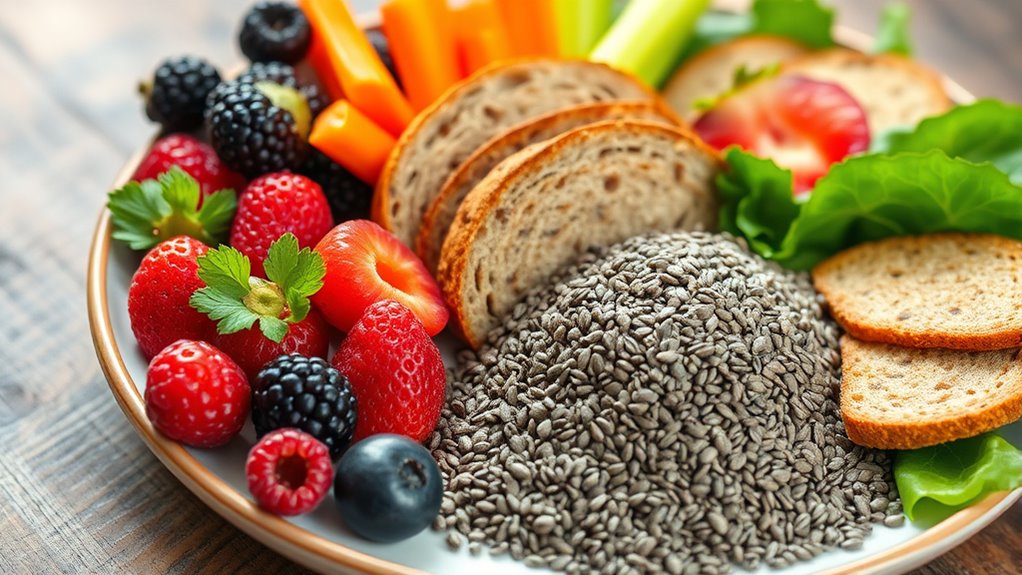To support menopausal weight loss, focus on adopting a Mediterranean-inspired diet rich in plant-based foods, healthy fats, and whole grains. Prioritize high-fiber foods, include omega-3-rich fish and seeds, and stay well-hydrated. Limit refined carbs and processed foods, while balancing nutrients like calcium, vitamin D, and magnesium for bone health. Combine these eating habits with regular activity and emotional awareness—more tips to help you stay on track await ahead.
Key Takeaways
- Embrace a Mediterranean-inspired diet rich in plant-based foods, healthy fats, and whole grains to support weight loss and reduce menopausal symptoms.
- Prioritize high-fiber foods like fruits, vegetables, and legumes to promote fullness, gut health, and steady blood sugar levels.
- Ensure adequate protein intake (1.0-1.2 g/kg body weight) and include calcium-rich foods to preserve muscle and bone density.
- Incorporate omega-3 fatty acids from fish, flaxseeds, and walnuts to reduce inflammation and support heart health.
- Limit processed foods and added sugars, focusing on minimally processed, nutrient-dense foods for sustainable weight management.
Embracing a Mediterranean-Inspired Eating Pattern

Embracing a Mediterranean-inspired eating pattern offers a practical way to support menopausal weight loss and overall well-being. Focus on plant-based foods like fruits, vegetables, and whole grains to nourish your body and promote satiety. Incorporate healthy fats, especially extra-virgin olive oil, to improve heart health and help manage weight. Legumes are another key component, linked to fewer menopausal symptoms and better health. This diet naturally limits processed foods, reducing empty calories and unhealthy additives. Aim for a balanced intake of proteins, carbs, and fats to support your weight loss goals while maintaining energy levels. By making these changes, you’ll not only help manage menopausal weight but also enjoy improved mood, sleep, and overall energy.
Prioritizing Whole Foods for Menopausal Wellness

Focusing on whole foods during menopause can considerably support your hormonal balance and overall health. Probiotics in these foods help modulate estrogen levels, which can improve weight management and cognitive health. Incorporating fermented foods like yogurt, sauerkraut, or kefir promotes gut health, linked to better estrogen metabolism. This balance may reduce menopausal symptoms and related metabolic changes. Data privacy concerns also emphasize the importance of choosing clean, minimally processed options to avoid exposure to additives and contaminants. Long-term adherence to whole food diets, including plant-based options, is feasible and supports sustained weight control and improved metabolic markers. These nutrient-dense foods provide essential vitamins, minerals, and antioxidants that help lower chronic disease risks, strengthen bones, and support cardiovascular health. Additionally, gut health plays a crucial role in hormone regulation and overall well-being during menopause. Incorporating a variety of water-rich foods can further enhance hydration and support metabolic function during this transitional period. Prioritizing whole foods empowers you to naturally balance hormones and enhance overall well-being during menopause.
Incorporating High-Fiber Foods to Boost Digestive Health

Incorporating high-fiber foods into your diet during menopause is essential for supporting digestive health and managing weight. Fiber helps keep your gut functioning smoothly, reducing constipation and discomfort common during this time. It also promotes feelings of fullness, which can curb overeating and support weight loss efforts. Additionally, fiber improves nutrient absorption, ensuring your body gets the vitamins and minerals it needs. Fermentable fiber feeds gut bacteria, boosting microbiome diversity and reducing inflammation, which may alleviate symptoms like joint pain. To reap these benefits, aim for 25-30 grams of fiber daily by including fruits, vegetables, whole grains, legumes, nuts, and seeds in your meals. Gradually increase your intake to avoid bloating and digestive issues, and consider fiber supplements if needed. Incorporating gut health strategies can further enhance overall well-being during menopause. Consuming a variety of fiber-rich foods can also help prevent digestive issues, supporting comfort and health.
Staying Hydrated to Support Overall Well-Being

Staying well-hydrated is essential for maintaining your overall well-being during menopause. Proper hydration helps regulate body temperature, supports detoxification, and keeps your skin, hair, and nails healthy. It also reduces urinary infections and keeps your brain functioning at its best. As hormonal changes can decrease thirst, it’s important to stay mindful of your fluid intake. Incorporating adequate water intake can significantly impact your health during this stage. Additionally, staying hydrated supports electric bike performance by maintaining energy levels and reducing fatigue, especially during outdoor activities. Regular hydration can also aid in organ function and overall metabolic health. Drinking enough water can also assist in hormonal balance, which is crucial during menopause. Proper hydration also influences Honda Tuning efforts by ensuring your body remains energized and responsive during physical activity. Here are key tips to stay hydrated: 1. Drink about 1600ml of water daily, adjusting for activity and environment. 2. Spread your fluid intake evenly throughout the day. 3. Include water-rich foods like fruits and vegetables. 4. Monitor your urine color—light yellow indicates proper hydration.
Limiting Refined Carbohydrates for Better Blood Sugar Control

Maintaining proper hydration is vital for supporting your overall health during menopause, but managing blood sugar levels is equally important for symptom relief and weight control. Limiting refined carbohydrates helps prevent blood sugar spikes, which can lead to insulin resistance and weight gain. By reducing intake of these foods, you can boost insulin sensitivity and promote stable energy levels. Focus on incorporating complex carbs like whole grains, fruits, and vegetables, which supply essential nutrients and fiber. These foods help manage inflammation, improve sleep, and reduce menopausal symptoms. Additionally, choosing foods that promote healthy blood sugar regulation can further support your health. Incorporating foods with glycolic acid can also enhance skin radiance and texture, supporting overall wellness during menopause. Recognizing the importance of nutrient-dense foods can help optimize your dietary choices and overall health. Paying attention to blood sugar management is crucial for maintaining energy and mood stability during menopause. Including antioxidant-rich foods may also help combat oxidative stress associated with menopause. Consider this table for better understanding:
| Food Type | Benefits | Examples |
|---|---|---|
| Whole grains | Fiber, nutrients, blood sugar control | Brown rice, quinoa |
| Fruits and vegetables | Vitamins, minerals, antioxidants | Berries, spinach |
| Legumes and nuts | Protein, fiber, satiety | Lentils, almonds |
| Healthy fats | Blood sugar stabilization | Avocado, olive oil |
| Lean proteins | Weight management, energy | Chicken, fish |
Ensuring Sufficient Protein and Calcium Intake

Ensuring adequate protein and calcium intake is essential for supporting your health during menopause. Proper protein intake helps maintain muscle strength, boosts metabolism, and prevents muscle loss, which slows during menopause. Calcium supports bone health, reducing osteoporosis risk as estrogen declines. To optimize these nutrients, consider:
- Consuming 1.0-1.2 grams of protein per kilogram of your body weight daily.
- Distributing protein evenly across meals with 25-30 grams each to preserve muscle.
- Including calcium-rich foods like dairy, leafy greens, or fortified plant milks daily.
- Combining calcium with vitamin D for better absorption and bone health.
- Incorporating strength training exercises to further support muscle preservation and bone density during menopause.
- Being aware that entertainment and parks often adjust their hours seasonally, which can impact planning your visits and activities around your health routines. Recognizing relationship patterns can also help you better understand your emotional well-being during this transitional phase.
- Supporting your overall health with nutrient-dense foods, which are especially important during menopause to meet increased nutritional needs and maintain energy levels.
Focusing on these habits helps you sustain lean muscle, strengthen bones, and support overall health during menopause. Proper nutrition is key to managing weight and essentiality.
Including Omega-3 Fatty Acids for Inflammation and Heart Health

Including omega-3 fatty acids in your diet can help reduce inflammation and support heart health during menopause. You can get these healthy fats from fatty fish like salmon or sardines, or take supplements if needed. Adding omega-3s may lower your risk of heart disease and help manage menopausal symptoms linked to inflammation. Incorporating a vetted flat iron bike can also promote physical activity, further supporting overall health during this stage. Incorporating anti-inflammatory foods rich in omega-3s can enhance these benefits and promote better hormonal balance. Using sustainable sourcing for your omega-3 sources ensures environmentally responsible choices that support eco-friendly living.
Omega-3 Sources Overview
Omega-3 fatty acids are essential nutrients that play a vital role in supporting heart health and reducing inflammation. To boost your intake, focus on diverse sources. Here are four key options:
- Fatty fish like salmon, mackerel, sardines, and anchovies are rich in EPA and DHA.
- Plant-based sources such as flaxseeds, chia seeds, walnuts, and hemp seeds provide ALA.
- Seaweed and algae offer vegetarian options of DHA and EPA.
- Fortified foods, like omega-3-enriched eggs and dairy, can supplement your diet.
While the human body can convert ALA into EPA and DHA, the process is limited, so including direct marine sources is ideal. Combining these options ensures you get a broad spectrum of omega-3 benefits for heart and overall health. Understanding omega-3s can help you make informed dietary choices to optimize their benefits.
Reducing Inflammation Naturally
Reducing inflammation naturally is essential for supporting overall health and easing menopausal symptoms. Incorporate foods rich in antioxidants, like leafy greens and berries, and healthy fats from olive oil, nuts, and seeds. Focus on omega-3 fatty acids found in oily fish and flaxseeds, which have strong anti-inflammatory effects. Lifestyle changes such as regular exercise, adequate sleep, and stress management further help reduce inflammation. Additionally, choosing office chairs for neck pain relief can improve comfort and reduce physical stress during daily activities. Incorporating nutritional strategies like consuming green juices can also support inflammation reduction, thanks to their high antioxidant content.
Heart Disease Risk Lowering
Inflammation plays a significant role in the development of heart disease, and targeting it can help lower your risk. Omega-3 fatty acids are key players in this effort, thanks to their anti-inflammatory and cardiovascular benefits. Consuming fish 1 to 3 times per month can reduce coronary heart disease death risk by 21% to 34%. Supplementing with omega-3s, especially EPA, can be particularly beneficial if your fish intake is low or you have multiple risk factors. Both EPA and DHA help improve heart health, with EPA showing more potent anti-inflammatory effects. To maximize benefits, consider these points:
- Incorporate fatty fish like salmon or sardines regularly.
- Use omega-3 supplements if dietary intake is insufficient.
- Focus on EPA-rich options for inflammation reduction.
- Maintain a balanced diet to support overall heart health.
Balancing Nutrients to Manage Menopausal Symptoms

To manage menopausal symptoms effectively, you need to balance key nutrients in your diet. Focus on calcium, vitamin D, and healthy fats to support bone strength and heart health. By doing so, you can help ease symptoms and promote overall well-being during menopause.
Essential Bone Nutrients
Maintaining strong bones during menopause hinges on a careful balance of essential nutrients that support bone structure and density. You need key nutrients like calcium, vitamin D, magnesium, and phosphorus to keep your bones healthy. Without enough of these, your risk of osteoporosis increases. To guarantee you’re getting enough, focus on:
- Consuming dairy products and fortified foods for calcium and phosphorus.
- Including fatty fish and fortified foods for vitamin D.
- Eating leafy greens, nuts, and legumes for magnesium.
- Maintaining a balanced diet with adequate protein to support bone repair.
Heart-Healthy Fats
During menopause, incorporating heart-healthy fats into your diet is essential for managing symptoms and reducing cardiovascular risks. Omega-3 fatty acids, found in fatty fish like salmon and mackerel, can help reduce hot flashes and mood swings while supporting your heart. Polyunsaturated fats in flaxseeds and chia seeds promote better cholesterol levels and overall heart health. Use healthy oils such as olive and canola to cook and dress salads—they’re great for weight management and cardiovascular support. Nuts and seeds like almonds, walnuts, and pumpkin seeds are convenient sources of healthy fats that curb cravings and boost your nutrient profile. Including these fats in your meals helps regulate cholesterol, reduce inflammation, and manage menopausal symptoms effectively.
Combining Diet With Physical Activity for Optimal Results

Combining a balanced diet with regular physical activity maximizes weight loss results during menopause. You’ll burn more calories and preserve muscle mass, which naturally declines with age. To optimize your efforts, focus on these key strategies:
- Incorporate at least 150 minutes of moderate aerobic activity weekly, like walking or cycling.
- Include strength training to build and maintain muscle, boosting your resting metabolism.
- Combine balance-focused exercises like yoga to improve overall fitness and reduce injury risk.
- Prioritize nutrient-dense foods rich in fiber, healthy fats, and protein to fuel workouts and support recovery.
This integrated approach not only accelerates fat loss but also helps manage menopausal weight gain, especially around the abdomen. Stay consistent for the best results.
Addressing Emotional and Social Factors to Sustain Healthy Habits

While eating well and exercising are essential for menopausal weight management, emotional and social factors also play a significant role in sustaining healthy habits. Stress, depression, and emotional triggers can lead to overeating, making it harder to stay on track. Support from friends, family, or groups boosts motivation and accountability. Engaging in community activities or accessing healthcare can provide emotional stability and practical guidance. Recognizing cultural differences and societal attitudes helps you understand your unique challenges. To stay committed, focus on stress management techniques like meditation and celebrate small wins. Building a strong support system and practicing emotional awareness ensures you maintain healthy habits during menopause.
| Emotional Factors | Social Support | Practical Strategies |
|---|---|---|
| Stress eating | Support groups | Mindfulness practices |
| Depression | Community events | Goal setting |
| Emotional triggers | Family encouragement | Self-monitoring |
| Anxiety | Healthcare access | Positive reinforcement |
| Mood swings | Cultural awareness | Consistency |
Frequently Asked Questions
How Can I Tailor a Mediterranean Diet for My Specific Calorie Needs?
To tailor a Mediterranean diet for your calorie needs, start by calculating your daily calorie target based on your activity level and goals. Adjust portion sizes of fruits, vegetables, grains, and protein sources accordingly. Choose whole grains over refined ones, and include healthy fats like olive oil and nuts in moderation. Keep meal frequency consistent, and monitor your intake to make certain you’re meeting your calorie needs without overeating.
What Are Some Easy Ways to Increase Fiber Intake Daily?
Fuel your day by filling your plate with fruits, vegetables, and whole grains. Incorporate raspberries, berries, and citrus for fiber and flavor, while adding dark leafy greens and salads for crunch and nutrients. Snack on legumes like chickpeas or lentils, and swap white rice for fiber-rich brown rice or quinoa. Slowly increase your intake, stay hydrated, and enjoy the delicious diversity that boosts your fiber and benefits your health.
How Do I Ensure I’M Getting Enough Vitamin D and Calcium?
To make certain you’re getting enough vitamin D and calcium, focus on eating dairy products like milk, yogurt, and cheese, or fortified plant-based alternatives. Include fatty fish such as salmon and sardines, and get some sunlight for vitamin D. Incorporate leafy greens and fortified cereals into your meals. Consider supplements if needed, aiming for around 1,200 mg of calcium and 800-1,000 IU of vitamin D daily, but consult your healthcare provider first.
Which Physical Activities Best Complement a Menopausal-Friendly Diet?
You should focus on activities that boost your metabolism and support bone health. Brisk walking, swimming, and hill or incline walking are excellent for burning calories and improving cardiovascular health. Incorporate strength training with weights to preserve muscle mass and enhance metabolism. Balance exercises like yoga or Tai Chi aid flexibility and reduce menopausal symptoms. Doing these regularly complements a healthy diet, helping you manage weight and maintain overall well-being during menopause.
How Can I Manage Emotional Eating During Menopause Effectively?
Think of emotional eating as a storm you can learn to navigate. To manage it, practice mindful eating by tuning into your hunger and feelings. Incorporate stress-relief techniques like meditation or yoga, and seek support from friends or professionals. Focus on balanced, nourishing foods, and be patient with yourself. Over time, you’ll gain control over your emotions, turning the storm into a calm sea of healthier habits.
Conclusion
Adopting these mindful eating habits can truly transform your menopausal journey. Some say menopause signals the end of liveliness, but evidence suggests it’s a new beginning—an opportunity to prioritize your health. When you embrace nourishing foods and stay active, you empower yourself to thrive. Remember, your body is resilient, and with consistent effort, you can overcome challenges and find renewed strength and balance. Believe in your ability to create a healthier, happier you.









